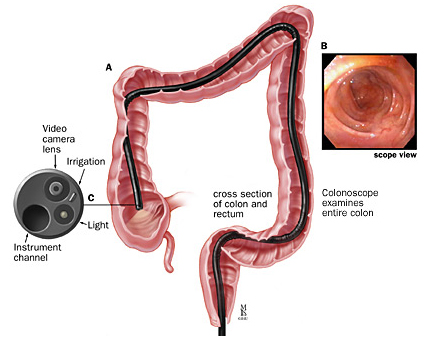A colonoscopy is a visual examination of the entire large intestine (colon) using a lighted, flexible colonoscope. To be certain you are comfortable and relaxed, you will be sedated through an I.V. In fact, most patients are asleep during the entire process and remember little to nothing about it.
What to expect: During the procedure
When it’s time to start the screening, you will be asked to lie on your side. Once sedation takes effect, the colonoscope is inserted through the rectum and moved gently around the bends of the colon. As the colonoscope makes its way through the colon, the physician can see the lining of the colon on a television screen. Typically, the physician looks all the way to the end of the large intestine, and back, for anything unusual. The entire scoping process typically takes between 15 and 30 minutes. When complete, your nurse will take you into a recovery area, where the sedation quickly wears off
What can be found
If polyps (very small growths of tissue) are found, your doctor can perform a biopsy immediately. The biopsy involves passing an instrument through the scope to remove the polyp, which is sent to a laboratory to be analyzed.
You should feel nothing when a biopsy or polyp is taken, and you should experience no recovery pain. While the overwhelming majority of polyps are harmless, your physician will have it tested and confirm your results with you. Results can take several days and the doctor’s office will call you to discuss the results. Furthermore, since most colon cancer starts as a benign polyp, when these are removed, the possibility of them growing into cancer is removed as well.
What happens afterwards?
Once your recovery nurse determines that most of the effect of the sedation has worn off, you will be released, however, you cannot drive. Even though you will feel fine, the lingering, subtle effects of the sedation will make it dangerous for you to drive, so a responsible adult must be there to take you home. You should be able to resume normal activity the next day.
How to Prepare
Thorough cleansing of the entire bowel is essential for effective results so there will not be a need for retesting. Instructions for doing this will be given by your physician, but this can include a combination of the following: enema, restriction from eating solid foods a day or two before the test and taking pill-form and/or liquid laxatives. You may be told to stop taking aspirin or other blood-thinning medications for several days before the test as well.
To avoid dehydration, patients should drink clear, fat-free bouillon or broth, gelatin, strained fruit juice (no grape juice or any liquid with red color), water, plain and unsweetened coffee or tea, or diet soda. Unless otherwise instructed, continue taking any regularly-prescribed medication. Your physician may also ask you to stop taking iron preparations a few weeks before the test if you are on them. Finally, you need to arrange for someone to drive you home afterward because lingering, subtle effects of the sedation will make it unsafe for you to drive until the next day.
Your doctor, at Magnolia Surgery Center, will also want to know if you have heart disease, lung disease, or any medical condition that may need special attention.

